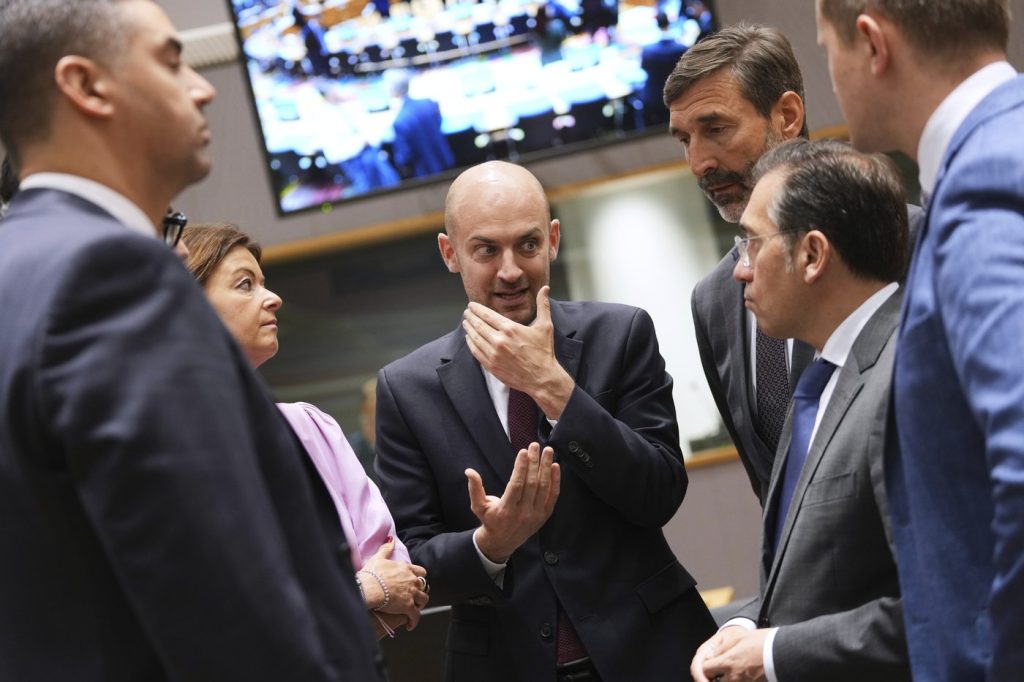LONDON (AP) - European nations are intensifying diplomatic efforts to deescalate the ongoing Israel-Iran war, following recent U.S. military strikes aimed at disrupting Iran's nuclear program. The weekend attack by the United States has intensified tensions, with both Israel and Iran exchanging strikes. Efforts by the European Union and the "E3" group, comprising Britain, France, and Germany, are focused on keeping dialogue open despite Iran's apparent reluctance to engage in talks with Washington.
The crisis was the focal point of a meeting among EU foreign ministers in Brussels, where concerns about Iranian retaliation and the potential for a wider conflict were discussed. Kaja Kallas, the bloc's foreign policy chief, expressed that the possibility of Iran blocking the Strait of Hormuz, a critical route for global shipping, poses an "extremely dangerous" threat.
Prior to the U.S. strikes, the E3 had engaged in a tense seven-hour meeting in Geneva with Iranian Foreign Minister Abbas Araghchi. Despite concluding with a vague promise for future discussions, no further E3 meetings are scheduled as of now. U.K. Foreign Secretary David Lammy has urged Iran to resume talks with the E3 and engage directly with the United States, a sentiment echoed by Germany's Foreign Minister Johann Wadephul, who emphasized that direct negotiations with the U.S. are crucial for resolving the conflict.
Amid these tensions, Araghchi traveled to Moscow for discussions with President Vladimir Putin, who condemned the U.S. actions as "unprovoked aggression" and expressed Russia's willingness to mediate the conflict. This diplomatic outreach emphasizes Iran's reliance on its allies, particularly Russia, as the situation escalates. European officials faced challenges in their diplomatic efforts, as they received little warning about the U.S. military strikes. Only Britain had been informed shortly before the attack occurred, leaving many countries surprised and scrambling for a response.
Complicating existing tensions, U.S. President Donald Trump posted on social media about potential "regime change" in Iran, despite claims from U.S. officials that they do not seek to displace the Iranian government. French Foreign Minister Jean-Noël Barrot explicitly rejected attempts at forced regime change, noting the dangers of thinking such an outcome could be achieved through military means.
Iran continues to assert that its nuclear program is intended for peaceful purposes, and U.S. intelligence suggests that Iran is not currently pursuing a nuclear weapon. However, both Trump and Israeli leaders argue that the regime poses an imminent threat due to its ability to rapidly develop nuclear capabilities.
Responses to the recent U.S. strikes have been mixed among European allies. While there is considerable alarm regarding the risk of a broader conflict and calls for de-escalation, some allies express relief that Iran's nuclear ambitions have faced setbacks. Tom Wells, a spokesman for the British Prime Minister, commented on the necessity of prioritizing diplomatic avenues to negotiate a comprehensive solution. Meanwhile, German Chancellor Friedrich Merz indicated support for Israel’s actions and the U.S. response, acknowledging the significant risks but emphasizing the untenability of the situation prior to the recent actions.
As diplomatic efforts continue, the situation remains fluid, and European leaders are cautious about the potential for escalation as they strive to facilitate talks while managing the complex geopolitical dynamics inherent in this crisis.











